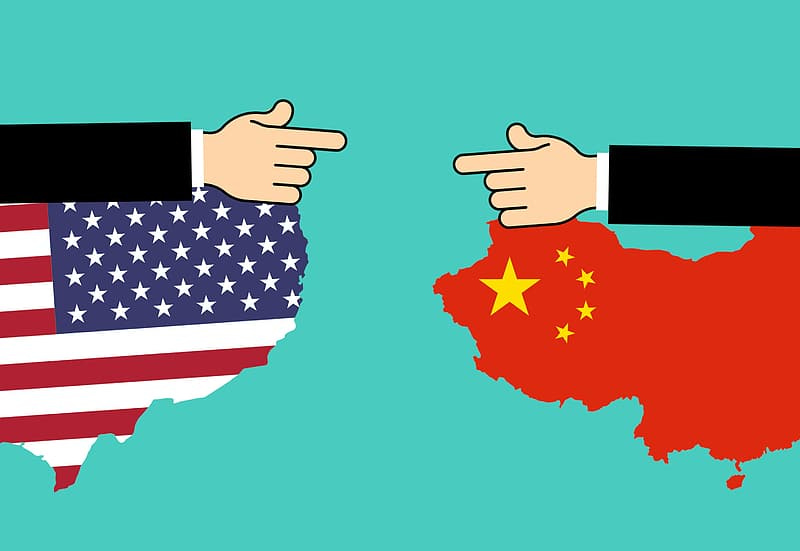Hi all! 👋 One thing that’s been on my mind, but that I haven’t really taken the time to understand, is the so-called trade war between the US and China. So I wanted to read up and put together a post on what’s really going on. Please comment below if you disagree (or agree) with my interpretation.
The economic backdrop of the current financial recession was a high performing US economy, but an emerging China-US trade war. Donald Trump sparked it off in 2018 when he increased tariffs on some goods imported from China, to which China retaliated by increasing tariffs on American goods. The main argument for doing so was to reduce the US trade deficit, i.e. reduce imports (which lowers GDP) and increase exports (which increases GDP).
Why is this important? Globalists or neoliberals, the advocates of trade agreements (e.g. NAFTA between Canada, Mexico and the US), argue everyone will be better off when there’s more trade. For example, Apple can outsource their production to China, which will create jobs for the Chinese and cheaper iPhones for the Americans. In other words, the more trade between countries, the cheaper it will be to produce and buy phones, cars, cheese and everything else we love and take for granted.
But not everyone believes global trade is good. The “trade war” is Trump’s response to a resentment in parts of the American population towards globalisation. People feel global trade has disadvantaged them and are angry because their jobs have been outsourced to other countries. This is largely true. But people’s anger stems not from the trade deals alone, but from the poor distribution of their gains. The value created by globalisation has made the rich richer, and the poor poorer.
Dani Rodrik claims that the gain from trade agreements are not equally distributed (and he also pointed out that the aggregate gain for the domestic economy is marginal). For example, in the wake of the NAFTA agreement, loads of communities were devastated as their factories shut down and moved to Mexico. This, coupled with the weak social security in the US, led to lots of people losing their livelihoods.
On the flipside, there are groups who benefit from trade deals, particularly large corporates who increase their exports (and revenue) but also outsource production to get cheaper labour. They become even wealthier.
So wouldn’t higher tariffs be a good solution? Rising tariffs aggressively and inciting “a war”creates a vicious cycle, in which trade is significantly reduced as prices increase, and workers, consumers and businesses lose. Instead, Rodrik believes that the fundamental issue of wealth distribution should be tackled first through domestic economic policies. Redesigning trade policies should be second priority.
Consider for a moment how trade with China is not so controversial in Europe. One of the main reasons is strong safety nets. If they lose their jobs, they can still go to the doctor when ill and kids can still get a decent education. They are not doomed to a life in poverty. Europe shows that redistributing the gains from global trade domestically is important socially.
To “fix” the trade deals, Rodrik believes corporates must have weaker influence on politicians (e.g. lobbying and funding), and small business owners and employees should have a bigger say in the design of the deals. The famous French economist, Thomas Piketty, has a similar point when he identifies that Scandinavia and Germany’s economic success and equality come in part from the inclusion of employees on company boards. They should be included in the design of global trade policies as well.
The good news is that although the headlines are big and dramatic, Rodrik believes we’re not close to a trade war – at least not yet. There are only tariffs on 5% of imports and public markets have seemed oblivious to the increased tariffs. And even though China and the US are competing on tariffs, other countries don’t have to join “the war”. No need to panic quite yet.
A big part of the American population is (probably rightfully) bitter for having lost their jobs to foreign workers. But a trade war is not the answer, and neither is free markets. But there is always going to be trade between countries, so it’s essential to make sure everyone can partake - and that means more inclusive economic policies domestically to distribute wealth more equitably, and including every stakeholder in the design of trade policies.
Do you disagree? Why? Shoot me a message in the comments section below 🏹 💬





Hi Daniel,
Long time no see. If I do agree that wealth distribution is one of the major problems that can lead people in the USA to blame China, I would say that it is not the reason why Trump started the "trade war". My point of view is that: if D. Trump knows he will benefit from going against China, he mainly wants to fight the increasing power of China.
As he says, he wants "America first", not second. I do believe that another US president would have made the same choices to distantiate from China if Trump did not make it. This is the reason why there is such a huge question about the intellectual property subject, and it is definitly not about the commercial balance.
To continue on the idea that there is some sort of Cold war between the USA and China, take a look at what is happening with the Coronavirus. USA blames China (https://www.reuters.com/article/us-health-coronavirus-trump-china/trump-confident-coronavirus-may-have-originated-in-chinese-lab-idUSKBN22C3TB) and China blames the USA (https://qz.com/1817736/china-fuels-coronavirus-conspiracy-theory-blaming-us-army/ / https://twitter.com/AmbassadeChine/status/1255873178632687622).
Quick résumé of my thoughts: US folks support Trump against China because of their loss of wealth, but Trump is doing it to diminish the power of China worldwide and keep America first.
Raphael (we brewed together in London :) I connect once a year to facebook and my first notification was that you had a blog. Here I am.)